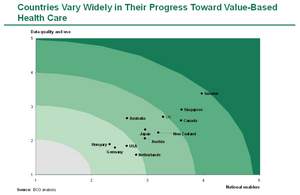TORONTO--(Marketwire - Jun 6, 2012) - Canada's health care system is among the best in the world when it comes to its readiness to adopt one of the most promising developments in the health care field -- an approach called "value-based health care." But major obstacles are preventing it from capturing the full potential of this trend, according to a new study by The Boston Consulting Group (BCG).
Value-based health care is an approach to controlling health-care costs while achieving better health for patients. It relies on documenting variations in clinical practices and in the results they achieve for patient outcomes. Making data on results and costs widely available allows doctors and other clinicians to identify and improve best practices based on real-world evidence. It also helps to steer resources toward the clinical centers and the specific clinical interventions, like drugs or surgical techniques, that achieve the best results.
BCG assessed the progress of 12 developed-world countries in implementing value-based health care. The results appear in a report titled "Progress Toward Value-Based Health Care: Lessons from 12 Countries," which is being released today.
The findings for Canada are striking. The research found that Canada achieved the highest score possible on three dimensions of its national health-care infrastructure: common national standards, national legal and consent frameworks, and patient and public engagement. Only one other country -- the UK -- hit the top score, and in only one dimension.
On the other hand, Canada posted a below-average score on its use of data collected, a key element of a country's overall progress toward value-based health care. This suggests that Canada has a huge unrealized opportunity to reduce costs and improve outcomes, if it can leverage its strengths.
"Canadians should be proud that our significant investment in health care over the years has positioned us as one of the world's leaders in this area," said Marc Gilbert, a senior partner in BCG's Toronto office and head of the firm's Canadian health care practice. "To take our system to the next level, we need clinicians and government leaders to better use and share the data that we're already collecting, so that we can establish real national benchmarks to further improve outcomes and impact from our scarce health care dollars."
BCG's assessment evaluates national health systems along two dimensions. The first is the degree to which key supports of value-based health care are in place at the national level -- for example, common national standards and IT infrastructure, national legal and consent frameworks, the ability to link health outcomes with costs, and high engagement on the part of clinicians and policymakers. The second is the quality of a country's existing disease registries (institutions that track selected health outcomes in a population of patients with the same diagnosis or who have undergone the same medical procedure), both in terms of the richness of the data and the sophistication of the medical community's use of that data.
"When it comes to implementing value-based health care, Sweden is the most advanced country of the 12 we studied, followed by Singapore, Canada, and the U.K.," said Neil Soderlund, a BCG partner and coauthor of the report. "By contrast, Germany and Hungary have the furthest to go." (See exhibit above.)
Detailed International Comparisons
The report is one of the most detailed international comparisons of progress toward value-based health care, combining a top-down assessment of national enablers with a bottom-up assessment of data quality and use at existing disease registries across 12 major health conditions. It uses 35 specific assessment criteria developed on the basis of previous BCG research in the field, a comprehensive survey of the medical literature, and 139 interviews with representatives of national health departments and with international health-outcome experts.
"We learned that a number of countries have begun to build the infrastructure and processes to support a value-based approach, but some are significantly farther along the learning curve than others," said Stefan Larsson, MD, a BCG senior partner and coauthor of the report. "Despite this differential in development and despite major differences in the structure and organization of national health care systems, there is much to learn from each country."
A copy of the report can be downloaded at www.bcgperspectives.com. To arrange an interview with Marc Gilbert, please contact Joanna Bailey at 416 957 7499 or bailey.joanna@bcg.com.
About The Boston Consulting Group
The Boston Consulting Group (BCG) is a global management consulting firm and the world's leading advisor on business strategy. We partner with clients from the private, public, and not-for-profit sectors in all regions to identify their highest-value opportunities, address their most critical challenges, and transform their enterprises. Our customized approach combines deep insight into the dynamics of companies and markets with close collaboration at all levels of the client organization. This ensures that our clients achieve sustainable competitive advantage, build more capable organizations, and secure lasting results. Founded in 1963, BCG is a private company with 77 offices in 42 countries. For more information, please visit bcg.com.
About bcgperspectives.com
Bcgperspectives.com is a new website -- available on PC, mobile phone, and iPad -- that features the latest thinking from BCG experts as well as from CEOs, academics, and other leaders. It covers issues at the top of senior management's agenda. It also provides unprecedented access to BCG's extensive archive of thought leadership stretching back almost 50 years to the days of Bruce Henderson, the firm's founder and one of the architects of modern management consulting. All of our content -- including videos, podcasts, commentaries, and reports -- can be accessed via PC, mobile, iPad, Facebook, Twitter, and LinkedIn.
